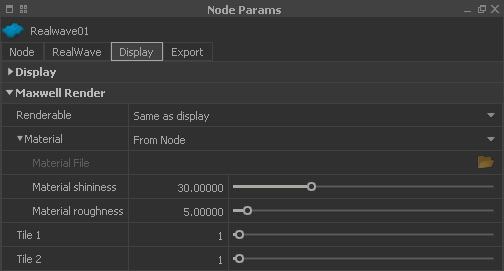RW - Maxwell Render
RealFlow does not only provide a convenient method to create plain previews from the viewports, but also to render images and movies in studio quality. With FIRE you can evaluate the look of a scene together with materials and a physically correct lighting system in realtime:
Render shelf > FIRE
Please take a look at the → “View and Render” chapters for more information about our built-in render engine.
Renderable
There are three options:
- “Same as display”. If the node is visible in the viewport then it will be rendered.
- “Yes”. The node will be visible in the preview regardless of its viewport visibility.
- “No” hides the node regardless of its viewport visibility.
Material
Here are the menu's entries:
- “From Node”. Maxwell will take the colour from the “Node” panel's “Color” parameter.
- “From File” lets you load an external MXM material file.
- Choose one of the predefined and ready-to-use materials.
Material File
This field is only available when “Material” is set to “From File”. With a click into the empty field you can load any valid MXM file.
Material shininess
This parameter is only available with “Material” set to “From Node”. Increasing this parameter creates stronger specular reflections and highlights. with very high settings you will get a mirror-like look and the original colour vanishes. Accepted values range from 0 to 100.
Material roughness
This parameter is only available with “Material” set to “From Node”. Higher settings will blur the specular highlights. Please avoid exaggerated settings. Accepted values range from 0 to 100.
Recalculate normals
When active the node's normals will be recalculated by Maxwell Render. If you experience problems like flickering in animations deactivate the option.
Threshold angle
With higher settings, the node appears smoother, with smaller setting a faceting effect appears. The final quality depends on the node's number of polygons.
Tile 1
In order to create the impression of an infinite ocean it is possible to tile the surface. Here, the number of repetitions in X direction is defined. Only the → “Ocean Statistical Spectrum” deformer creates a seamless surface.
Tile 2
In order to create the impression of an infinite ocean it is possible to tile the surface. Here, the number of repetitions in Z or Y direction is defined – this depends on your → axis setup. Only the → “Ocean Statistical Spectrum” deformer creates a seamless surface.
